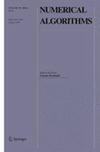针对水平线性互补问题的基于模数的通用双松弛两扫矩阵分割迭代法
IF 2
3区 数学
Q2 MATHEMATICS, APPLIED
引用次数: 0
摘要
针对水平线性互补问题(HLCP)的求解,我们提出了一种基于矩阵分裂迭代的一般双松弛两扫模迭代法和一种基于矩阵分裂迭代的双松弛两扫模迭代法。当系统矩阵为(H_+\)矩阵时,我们分析了这些方法的收敛理论。本文中的数值例子说明,这些方法比基于模的矩阵分裂迭代法和一般基于模的矩阵分裂迭代法更有效。本文章由计算机程序翻译,如有差异,请以英文原文为准。
General double-relaxation two-sweep modulus-based matrix splitting iteration methods for horizontal linear complementarity problem
For solving horizontal linear complementarity problem (HLCP), we propose a general double-relaxation two-sweep modulus-based matrix splitting iteration method and a double-relaxation two-sweep modulus-based matrix splitting iteration method which contain a series of methods, by using different splittings. When the system matrices are \(H_+\)-matrices, we analyze convergence theory of these methods. Numerical examples in this paper illustrate that these methods are more efficient than modulus-based matrix splitting iteration method and general modulus-based matrix splitting iteration method.
求助全文
通过发布文献求助,成功后即可免费获取论文全文。
去求助
来源期刊

Numerical Algorithms
数学-应用数学
CiteScore
4.00
自引率
9.50%
发文量
201
审稿时长
9 months
期刊介绍:
The journal Numerical Algorithms is devoted to numerical algorithms. It publishes original and review papers on all the aspects of numerical algorithms: new algorithms, theoretical results, implementation, numerical stability, complexity, parallel computing, subroutines, and applications. Papers on computer algebra related to obtaining numerical results will also be considered. It is intended to publish only high quality papers containing material not published elsewhere.
 求助内容:
求助内容: 应助结果提醒方式:
应助结果提醒方式:


